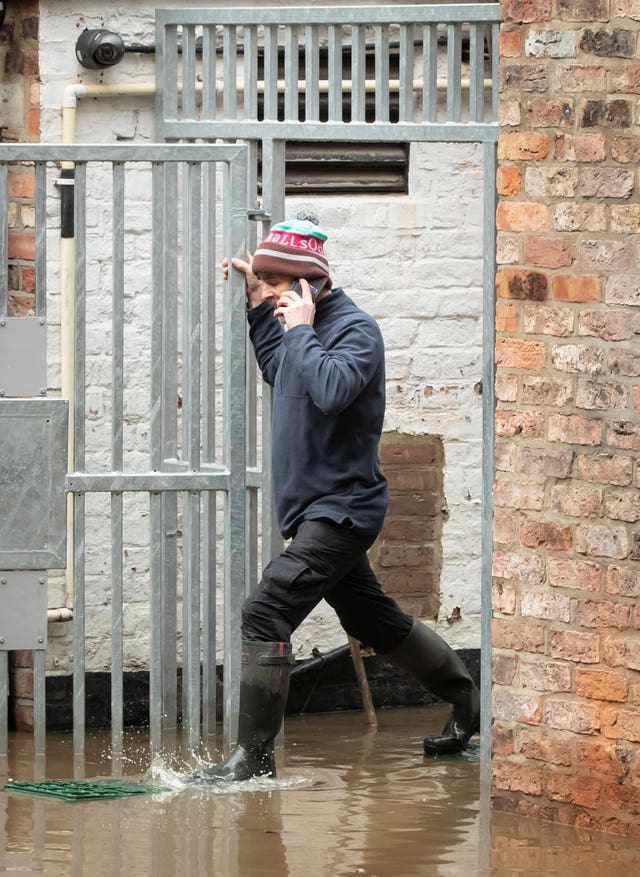
Snow falls are expected to cause problems across Scotland, Northern Ireland and northern England as warnings of further flooding are issued.
Even lower levels in Scotland are expected to get a covering of snow on Monday – with traffic disruption predicted for the morning commute – as the new working week begins with more stormy weather.
Further south, a fresh severe flood warning – meaning an imminent danger to life – has been issued for the River Severn in Shrewsbury, as the Environment Agency warned of ongoing flooding dangers across England.
The Environment Agency has issued a severe flood warning at Shrewsbury. Please stay safe and stay up to date https://t.co/mkD75Zz4kC pic.twitter.com/HyatnBQn4R
— Mike Grimes (@MikeGrimesEA) February 23, 2020
The gloomy forecast came as Environment Secretary George Eustice defended Prime Minister Boris Johnson for defying calls to visit flood-stricken areas despite a third consecutive weekend of storms.
Mr Eustice told Sky’s Sophy Ridge On Sunday: “It’s not true that the Prime Minister’s not been engaged in this.”
He said: “In a Cabinet Government it’s not a one-man show, it’s right that on certain operational things such as this that the Prime Minister will ask one of his Cabinet members to lead, I can’t see anything wrong with that.”
A yellow weather warning has been issued for snow across all but the most northern areas of Scotland from 3am on Monday. Higher ground is expected to see significant accumulations but commuters in the Central Belt have been warned to take care.
The latest satellite image shows an area of low pressure developing as it heads towards the UK for tonight and tomorrow 🛰️
Weather warnings have been issued – Stay #WeatherAware pic.twitter.com/oaugrGVyFd
— Met Office (@metoffice) February 23, 2020
Met Office forecaster Simon Partridge said: “It could be a pretty tricky commute first thing tomorrow for a lot of people.
“It’s certainly turning more wintry.”
Mr Partridge said Northern Ireland and parts of northern England are also expected to see snow, especially on higher ground and yellow weather warnings have been issued here for snow and rain.
He said that areas of the north that dodge the snow are still likely to see large amounts of rain and gale force winds.
As well as the severe flood warning for Shrewsbury, the Environment Agency (EA) had issued 88 flood warnings and 179 flood alerts by Sunday night.
The agency’s map of warnings and alerts shows danger areas stretching from Cornwall to the Norfolk coast and from Dorset to the Scottish border.
An EA spokesman said ongoing flooding is possible for parts of the West Midlands, along the Severn and Wye and also in parts of the north of England, including in the lower River Aire in Yorkshire.

He said: “This rain is falling on saturated catchments where river levels are already high.”
England has already received over 141% of its average February rainfall so far but the spokesman said it was too early to comment on reports that it is looking like being the wettest February for 30 years.
Caroline Douglass, director of incident management at the Environment Agency, said: “Further spells of rain across England could cause further flooding, particularly in Yorkshire and the Midlands. River levels remain high and ongoing river flooding remains probable for the River Severn next week as it responds to heavy rainfall.”
Scotland saw further flooding on Saturday, with a number reports of vehicles becoming stranded in various towns and villages west of Glasgow.
The Scottish Environmental Protection Agency said eight flood warning were in force on Sunday night with four further flood alerts.
And, in Wales, there were three flood warnings in force and eight alerts.
Politicians in south Wales have appealed directly to the Chancellor for help following the devastating floods caused by Storm Dennis.
In a letter to Rishi Sunak, the group including four MPs described flooding in the Rhondda Cynon Taf (RCT) area as “a national emergency on our doorsteps”.
More than 600 households and a similar number of businesses have been hit in Wales, representing almost 25% of all the properties affected across the UK.
While the extreme weather should settle down over Tuesday and Wednesday – accompanied with a notable dip in temperatures – the Met Office said further heavy rain is expected on Friday.
The bleak outlook follows more than a fortnight of downpours and flooding that started with Storm Ciara, continued with Storm Dennis and then kept going with the storms over the weekend, which – contrary to some reports – have not been named by the Met Office.


Comments: Our rules
We want our comments to be a lively and valuable part of our community - a place where readers can debate and engage with the most important local issues. The ability to comment on our stories is a privilege, not a right, however, and that privilege may be withdrawn if it is abused or misused.
Please report any comments that break our rules.
Read the rules here